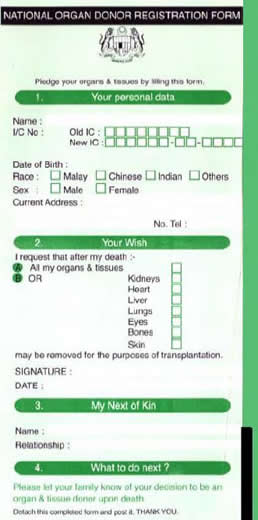Is Kidney Transplantation done in Malaysia?
There are 1841 patients with functioning kidney transplants as of 31 December 2010. Of these about 55% are done in Malaysia.
Government nephrology transplant centers in Malaysia :
- Kuala Lumpur Hospital
- Selayang Hospital
- Hospital Universiti Kebangsaan Malaysia
- University Malaya Medical Centre
Kidney transplant is the best option of RRT as it provides the patient the best quality of life and improves survival. However, it may be limited by the presence of suitable living donors, the availability of deceased donors and co-morbid conditions of the recipients. The donor and the recipient can function with one kidney and neither requires dialysis after a successful transplantation.
How is a kidney transplant done?
The transplant surgery is done under general anaesthesia. Usually the nonfunctioning kidneys are left in place and the healthy one is transplanted into the abdomen.
Prior to living kidney donation, the donors will undergo a thorough medical examination to ensure fitness for surgery and also to reduce possible long term complications of nephrectomy.
In Malaysia, the waiting list for a deceased donor kidney is quite long (8 to 10 years) due to lack of donation from the public.
What are the contraindications ti kidney transplant?
- HIV infection
- Malignancy – relative contraindication
- Severe cardiovascular disease
- Diabetes with multi-organ failure
- Psychosis
- Non-compliance
- Active substance abuse
- Chronic active hepatitis or cirrhosis
- Elderly age group (more than 65 years)
If I am interested in having a living kidney transplant, who do I see?
Consult the nearest hospital – either a physician or a nephrologist. Who would be able to refer you to centres performing transplants for further work-up.
What are the benefits of a kidney transplant?
- You would be free from dialysis as long as you have an adequately functioning graft
- Less dietary and fluid restrictions compared to when you were on dialysis
- Better quality of life
- Better survival
- Freedom to travel, work and go back to school
If I want to be a donor who do I consult?
You can opt to be a living related donor for a family member who requires a kidney transplant or a deceased donor (when you die).
If you wish to be a living related donor, you would have to see the Transplant Nurse Coordinator of a Nephrology Transplant Centre as to have a physical examination and multiple screening tests to ensure your fitness for surgery. The process of preparation of a potential kidney donor on average may take around 3-6 months in straightforward cases.
If you wish to be a cadaveric donor, please contact :
Website : http://www.agiftoflife.gov.my
Facebook : www.facebook.com/agiftoflife
National Transplant Resource Centre (Main Lobby)
Hospital Kuala Lumpur
Jalan Pahang
50586 Kuala Lumpur
Menara Wisma Sejarah
Tingkat 5, Jalan Tun Razak, 50700 KL.
Email : ntrc@moh.gov.my
Tel : 03-26942704/ 2705
03-26156576
Fax : 03-26156269
Tol Free Number : 1-800-88-9080
Transplant Resource Centre
Hospital Raja Permaisuri Bainun
Jalan Hospital 30990 Ipoh
Perak Darul Ridzuan
Tel : 05-5222324
Fax : 05-5222578
Transplant Resource Centre
Hospital Pulau Pinang
Jalan Residensi
10990 Georgetown
Pulau Pinang
Tel : 04-2225780
Fax : 04-2292433
Transplant Resource Centre
Hospital Sultanah Aminah Johor Bahru
Jalan Abu Bakar
80100 Johor bahru
Johor Darul Takzim
Tel : 07-2257000 ext. 2751
Fax : 07-2242694
Or just fill in this form and send it to the above.

What are the possible complications of renal transplant?
- Rejection – adherence to immunosuppression regime is mandatory
- Infections – which may be life threatening
- Hypertension
- Post-transplant diabetes mellitus
- Cancer – due to long term immunosuppression
- Side-effects of various immuno-suppressive agents
Support group
Malaysian Society of Nephrology – www.msn.org.my.
Link – www.malaysiayellowpages.net/organdonation/nation.htm
| Last reviewed | : | 26 April 2012 |
| Writer | : | Dr. Anita Bhajan Manocha |
| Reviewer | : | Dr. Sunita a/p Bavanandan |







